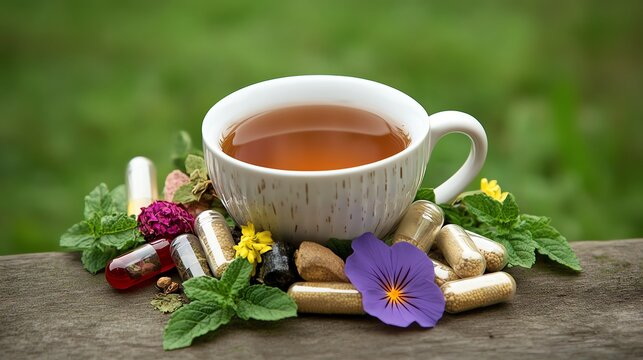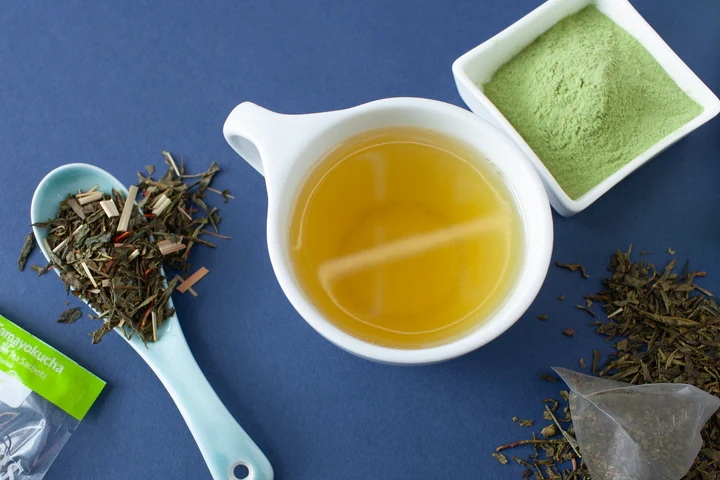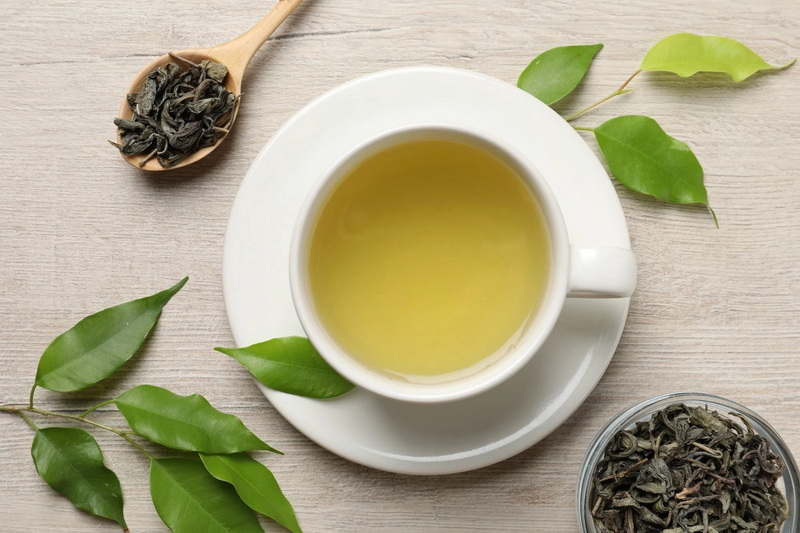Content Menu
● Understanding Green Tea Extract
● The Role of Vitamin K
● Vitamin K Content in Green Tea Extract
● Green Tea Extract and Anticoagulant Medications
● Health Benefits of Green Tea Extract
● Recommended Dosage and Safety Considerations
● Green Tea Extract and Other Medications
● Choosing Quality Green Tea Extract Supplements
● Alternatives to Green Tea Extract
● Conclusion
● Frequently Asked Questions
>> 1. Can I take green tea extract if I'm on blood thinners?
>> 2. How much green tea extract should I take daily?
>> 3. Are there any side effects of taking green tea extract?
>> 4. Can green tea extract help with weight loss?
>> 5. Is it better to drink green tea or take green tea extract supplements?
● Citations:
Green tea has long been celebrated for its numerous health benefits, ranging from its antioxidant properties to its potential role in weight management. However, for individuals taking blood-thinning medications, understanding the vitamin K content in green tea extract is crucial. This article delves into the intricacies of green tea extract, its vitamin K content, and the implications for those on anticoagulant therapy.

Understanding Green Tea Extract
Green tea extract is a concentrated form of green tea, derived from the leaves of the Camellia sinensis plant. It contains a potent blend of polyphenols, particularly catechins, which are responsible for many of its health-promoting properties[1]. The most abundant and well-studied catechin in green tea is epigallocatechin gallate (EGCG), known for its powerful antioxidant effects[2].
The Role of Vitamin K
Vitamin K is an essential nutrient that plays a crucial role in blood clotting. It's found in various foods, particularly leafy green vegetables. For most people, consuming foods rich in vitamin K is beneficial. However, for those taking anticoagulant medications like warfarin (Coumadin), maintaining a consistent intake of vitamin K is important to ensure the effectiveness of the medication[9].
Vitamin K Content in Green Tea Extract
Contrary to common belief, the amount of vitamin K in brewed green tea and green tea extract is relatively low. According to research, a cup of brewed green tea contains approximately 0.03 micrograms (mcg) of vitamin K per 3.5 fluid ounces (about half a cup)[9]. This is a minimal amount compared to other dietary sources of vitamin K.
It's important to note that while dried green tea leaves have a high concentration of vitamin K, the brewing process significantly reduces the amount that ends up in the final beverage. Green tea extract, which is often consumed in capsule form, typically contains similar or even lower amounts of vitamin K compared to brewed tea[7].
Green Tea Extract and Anticoagulant Medications
For individuals taking blood-thinning medications like warfarin, the low vitamin K content in green tea extract is generally not a cause for concern. However, it's always advisable to consult with a healthcare provider before adding any new supplement to your regimen, especially if you're on anticoagulant therapy[1][7].
The primary concern with green tea extract and anticoagulants is not necessarily the vitamin K content, but rather the potential interactions between the catechins in green tea and the medication. Some studies suggest that green tea may affect blood clotting through mechanisms unrelated to vitamin K[5].
Health Benefits of Green Tea Extract
While the vitamin K content in green tea extract is minimal, its other components offer numerous health benefits:
1. Antioxidant Properties: The catechins in green tea extract, particularly EGCG, are powerful antioxidants that can protect cells from damage caused by free radicals[2].
2. Heart Health: Regular consumption of green tea extract has been associated with lower blood pressure and improved cholesterol levels, potentially reducing the risk of cardiovascular diseases[2].
3. Weight Management: Some studies suggest that green tea extract may boost metabolism and increase fat burning, potentially aiding in weight loss efforts[2].
4. Brain Function: The combination of caffeine and L-theanine in green tea extract may improve brain function, including aspects of mood, vigilance, reaction time, and memory[4].
5. Liver Protection: Research indicates that green tea extract may help protect the liver from damage and reduce the risk of liver diseases[5].

Recommended Dosage and Safety Considerations
While green tea extract is generally considered safe, it's important to adhere to recommended dosages. Experts typically suggest a daily intake of 250-500 mg of green tea extract, which is equivalent to about 3-5 cups of green tea[3]. However, individual needs may vary, and it's always best to consult with a healthcare provider before starting any new supplement regimen.
It's worth noting that excessive consumption of green tea extract can lead to adverse effects, particularly due to its caffeine content and the potential for liver toxicity at very high doses[3]. Some individuals may experience side effects such as headaches, nervousness, or digestive issues when consuming large amounts of green tea extract.
Green Tea Extract and Other Medications
While the focus of this article is on vitamin K and anticoagulants, it's important to be aware that green tea extract can interact with various other medications. For example:
- It may reduce the effectiveness of certain antibiotics and drugs used to treat psychological disorders.
- The caffeine in green tea extract can interact with stimulant medications.
- Green tea's potential to lower blood sugar levels may interact with diabetes medications[1].
Always inform your healthcare provider about all supplements you're taking, including green tea extract, to avoid potential drug interactions.
Choosing Quality Green Tea Extract Supplements
When selecting a green tea extract supplement, consider the following factors:
1. Standardization: Look for products standardized to contain a specific percentage of polyphenols or EGCG.
2. Third-party testing: Choose supplements that have been tested by independent laboratories for purity and potency.
3. Decaffeinated options: If you're sensitive to caffeine, opt for decaffeinated green tea extract.
4. Form: Green tea extract is available in capsules, tablets, and liquid forms. Choose the form that best fits your lifestyle and preferences.
Alternatives to Green Tea Extract
For those who are concerned about potential interactions with medications or simply prefer alternatives, there are other ways to incorporate the benefits of green tea into your diet:
1. Brewed green tea: Drinking green tea in its traditional brewed form allows you to enjoy its benefits with minimal risk of excessive intake.
2. Matcha: This powdered form of green tea offers a concentrated source of antioxidants and can be used in various recipes.
3. Other herbal teas: Many herbal teas offer antioxidant benefits similar to green tea without the concern of vitamin K or caffeine content.
Conclusion
In conclusion, the amount of vitamin K in green tea extract is minimal and generally not a significant concern for most individuals, including those on anticoagulant therapy. A cup of brewed green tea contains only about 0.03 mcg of vitamin K, and green tea extract supplements typically contain similar or even lower amounts.
However, it's crucial to remember that while the vitamin K content may be low, green tea extract can still interact with various medications, including blood thinners, through other mechanisms. The catechins and caffeine in green tea extract can affect blood clotting and interact with other drugs.
For those taking anticoagulants or other medications, it's essential to consult with a healthcare provider before adding green tea extract to your regimen. They can provide personalized advice based on your specific health situation and medication needs.
Green tea extract offers numerous potential health benefits, from its powerful antioxidant properties to its potential role in heart health and weight management. When used responsibly and under proper guidance, it can be a valuable addition to a healthy lifestyle.
As with any supplement, moderation is key. Adhering to recommended dosages and being aware of potential interactions and side effects is crucial for safe consumption. By staying informed and working closely with healthcare providers, individuals can make the most of green tea extract's benefits while minimizing potential risks.

Frequently Asked Questions
1. Can I take green tea extract if I'm on blood thinners?
While green tea extract contains minimal vitamin K, it's crucial to consult your healthcare provider before taking it if you're on blood thinners. Green tea can interact with these medications through mechanisms unrelated to vitamin K content.
2. How much green tea extract should I take daily?
The recommended daily dosage of green tea extract typically ranges from 250-500 mg. However, individual needs may vary, so it's best to consult with a healthcare professional for personalized advice.
3. Are there any side effects of taking green tea extract?
Some people may experience side effects such as headaches, nervousness, or digestive issues when consuming large amounts of green tea extract. Excessive intake can also lead to more serious issues like liver toxicity.
4. Can green tea extract help with weight loss?
Some studies suggest that green tea extract may boost metabolism and increase fat burning, potentially aiding in weight loss efforts. However, it should be used in conjunction with a healthy diet and regular exercise for best results.
5. Is it better to drink green tea or take green tea extract supplements?
Both forms offer health benefits. Drinking green tea provides a more natural and balanced intake of its compounds, while supplements offer a more concentrated dose. The choice depends on personal preference and health goals, but it's always wise to consult a healthcare provider before starting any supplement regimen.
Citations:
[1] https://www.urmc.rochester.edu/encyclopedia/content?contenttypeid=19&contentid=greenteaextract
[2] https://www.healthline.com/nutrition/10-benefits-of-green-tea-extract
[3] https://medalerthelp.org/blog/green-tea-extract-dosage/
[4] https://www.mountsinai.org/health-library/herb/green-tea
[5] https://pmc.ncbi.nlm.nih.gov/articles/PMC6412948/
[6] https://teatimefacts.com/green-tea-vitamin-k/
[7] https://johnshopkinshealthcare.staywellsolutionsonline.com/19,GreenTeaExtract
[8] https://www.medicalnewstoday.com/articles/269538
[9] https://www.drweil.com/health-wellness/body-mind-spirit/disease-disorders/watch-out-for-vitamin-k/






























